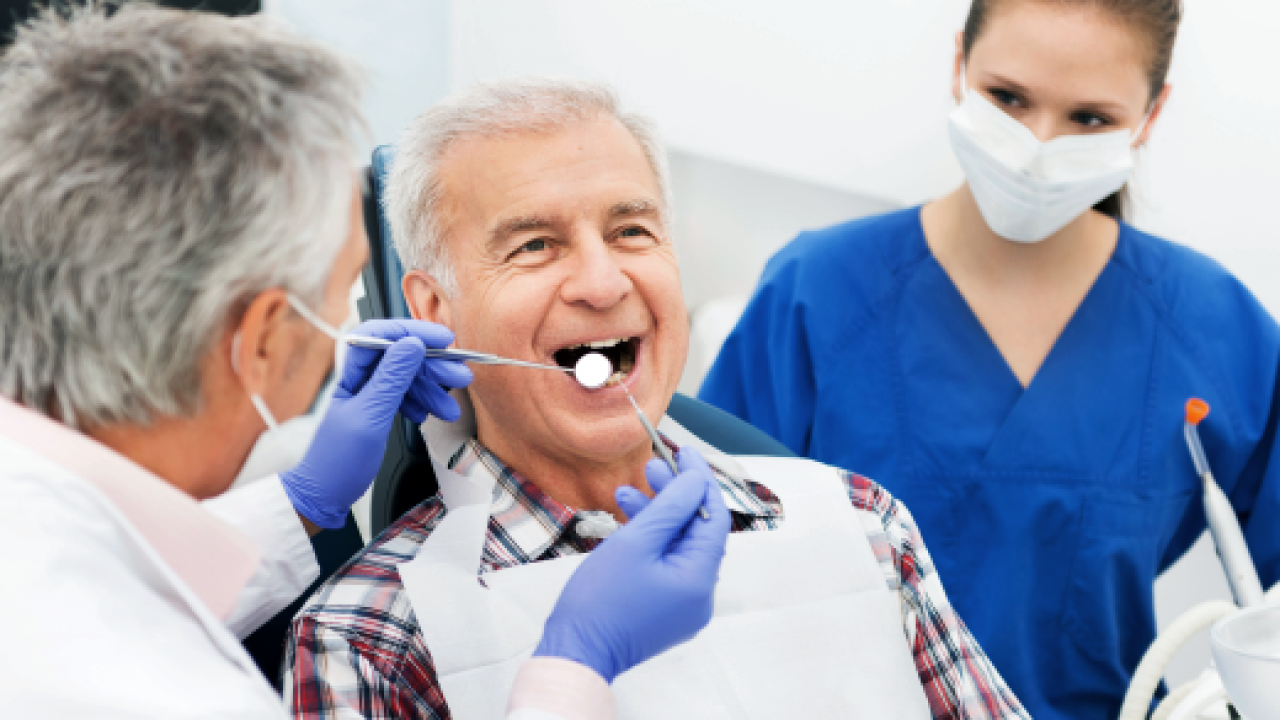Oral Care Tips for Older Adults

As we age, our teeth are subject to decay and erosion. But if we let this happen, we will have a reduced quality of life; our teeth are necessary for chewing food, speaking clearly, and smiling throughout our lives. It’s important to take care of them to preserve these functions.
You may want to take better care of your teeth, but you aren’t sure how—you already brush them twice a day, what more is there than that? Take note of the following tips to upgrade your oral health routine and keep your smile in top shape:
Try to avoid dry mouth.
Dry mouth is caused by a lack of saliva, a natural body fluid that helps remove bacteria and food debris. Without it, our teeth are subject to developing cavities or gum disease. You’re at a greater risk of dry mouth as you age, simply because it’s more likely that you’ll be taking medications that cause it. While this might not seem like a big issue, it can be detrimental to your teeth.
If you have a dry mouth, there are steps you can take to reduce this symptom. First, increase your water intake! Make sure to keep a bottle of water near you so that you remember to stay hydrated. Try to avoid beverages that cause dehydration like alcohol or coffee. If dry mouth is causing problems for you, ask your doctor about what changes can be made to your medication to alleviate this situation.
Treat any issues with your teeth.
There are many reasons why a person might avoid going to the dentist. They may have a fear of needles, maybe they don’t have dental insurance, or perhaps they know that they have a problem but are hesitant to fix it. In all of these issues, the answer remains the same: it’s still important to take care of your teeth properly.
By scheduling a regular dental check-up, the dentist will be able to detect cavities when they are still small. Left untreated, you will need dental crowns and bridges to fix these problems. Not only is that more expensive, but it can be unpleasant to endure. Seek dental care ASAP whenever a tooth cracks, chips, or aches.
Floss once a day.
Are you aware of all the benefits of flossing? Perhaps one of the most important reasons why older adults should floss is that it helps to prevent periodontal disease. This disease can lead to gum recession, plaque buildup, and a higher chance of having a heart attack or stroke. The only way to remove the food debris between our teeth is to floss them. It may not be your favorite activity, but it certainly is an important one.
Use mouthwash.
You might use mouthwash when you have stubborn bad breath that just won’t go away, like when the garlic chicken you ate for lunch stays past its welcome. But if you use mouthwash more often, your teeth will reap the benefits. Prevent pain and sensitivity by following up your brushing and flossing habits with the use of an antiseptic mouthwash. Swish it around your mouth after you eat and before you go to bed to reduce your chances of developing a cavity. It works to relieve irritation, kill bacteria, and prevent infections.
Get a new toothbrush.
When was the last time you replaced your toothbrush? You should look at purchasing a new one every three months or so. Pay attention to how firm the bristles are—if they are too rigid, they can cause receding gums. Always select a brush with soft bristles.
Try a fluoridated toothpaste.
Some of us have fluoride in our tap water to strengthen our teeth, but this isn’t the case in every state. Seek out toothpaste with this ingredient to give your mouth extra protection. Alternatively, you can use a fluoride rinse. When you visit the dentist twice a year, they’ll typically apply a fluoride treatment that will keep your teeth strong between cleanings.
Pay attention to your diet.
Even with the most diligent brushing and flossing routine, your efforts will be nullified by a sugary or acidic diet. Try cutting back on sweets to save your teeth. If you drink an acidic beverage like soda or coffee, wait at least 30 minutes before you brush. The acid makes your teeth especially vulnerable to abrasion. Instead, rinse with water in the meantime, then follow-up with a brushing once enough time has passed.
Our teeth are with us for our entire lives. By taking care of them, we can avoid the inconveniences of dentures and other tooth replacement procedures. This will allow us to enjoy our favorite foods without pain and speak without feeling self-conscious about our smile. It’s an investment for a lifetime of healthy teeth.